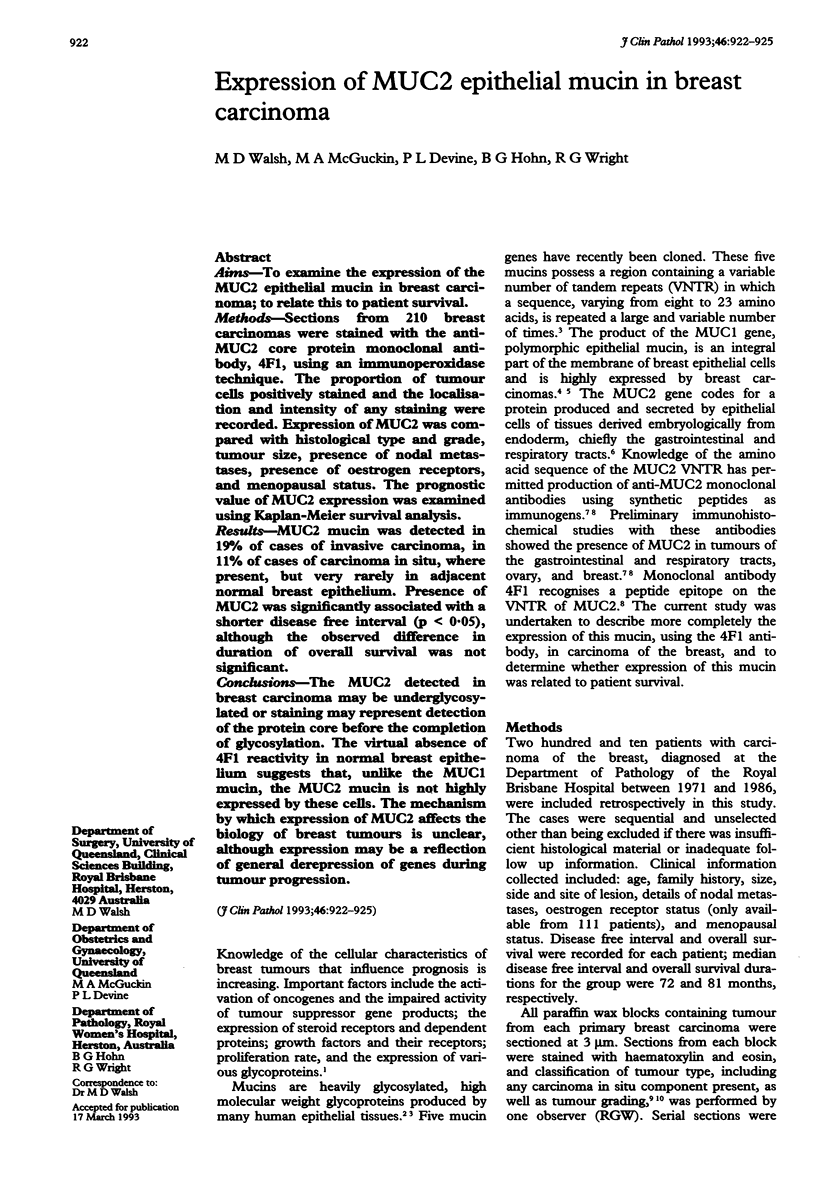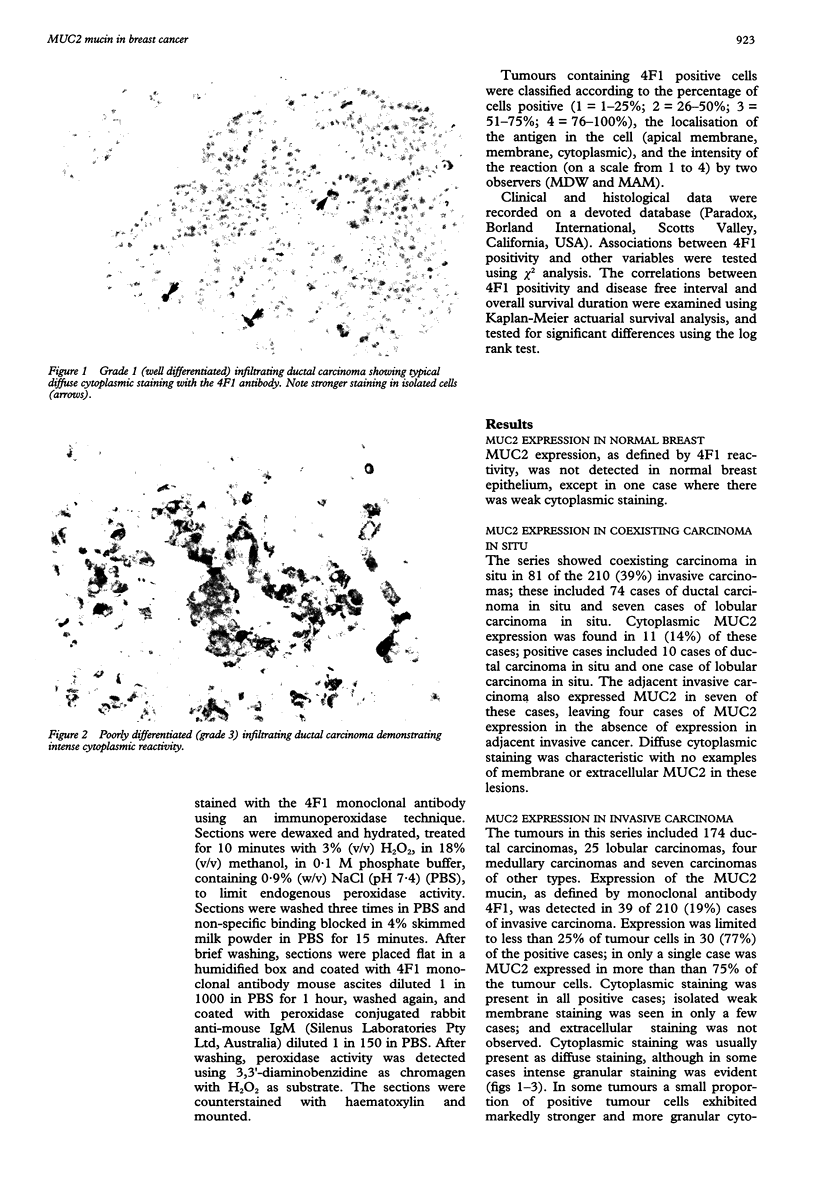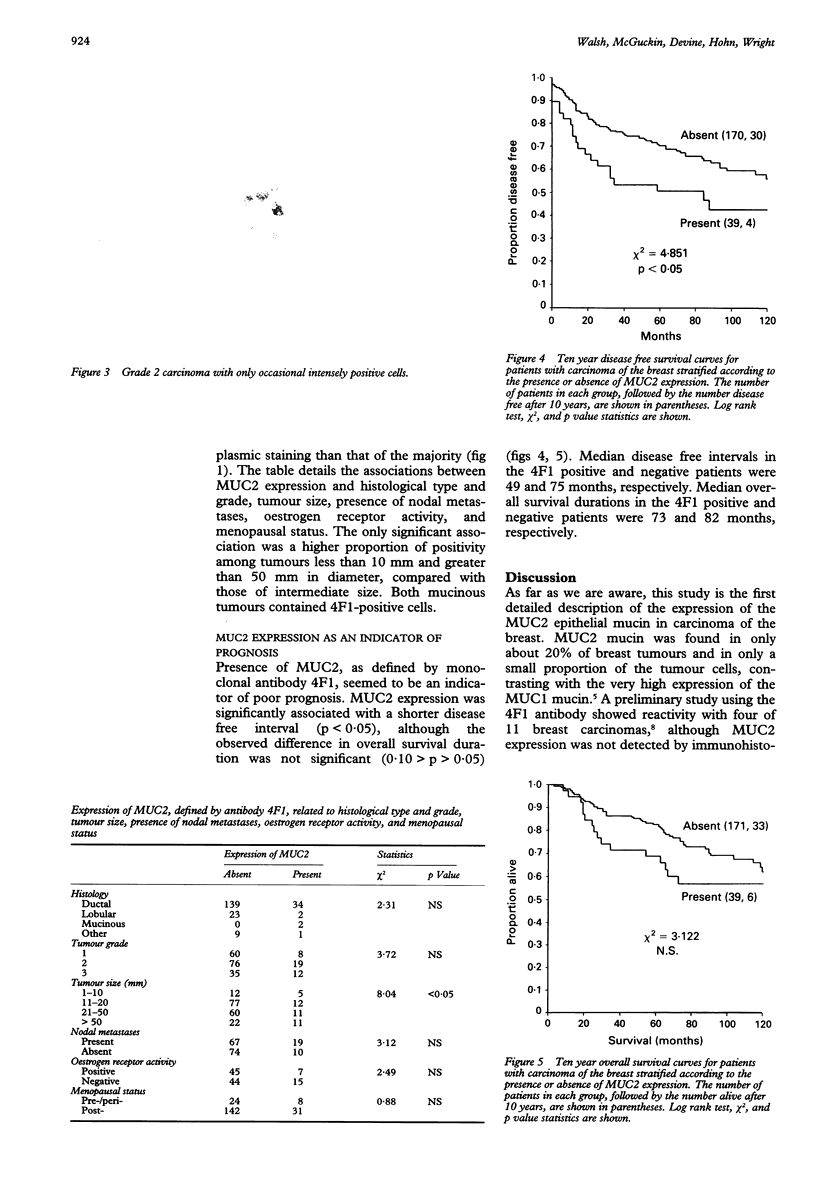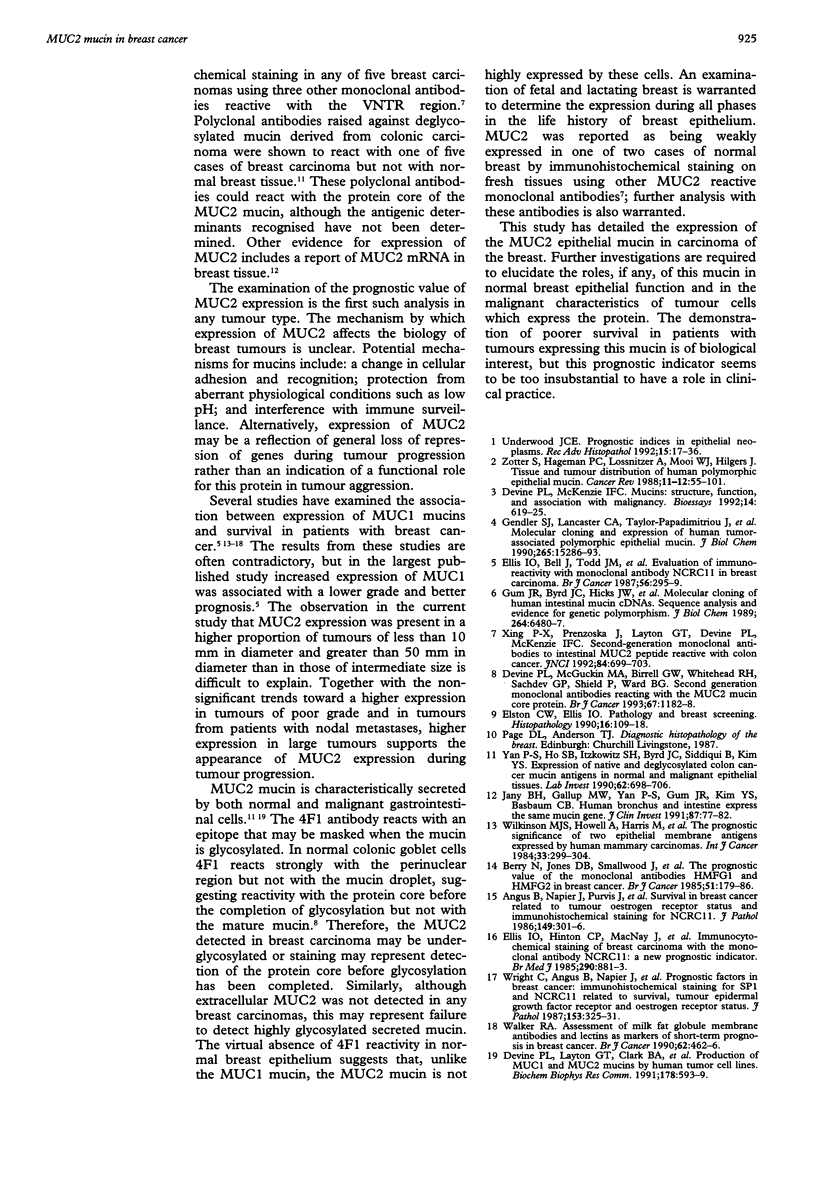Abstract
AIMS--To examine the expression of the MUC2 epithelial mucin in breast carcinoma; to relate this to patient survival. METHODS--Sections from 210 breast carcinomas were stained with the anti-MUC2 core protein monoclonal antibody, 4F1, using an immunoperoxidase technique. The proportion of tumour cells positively stained and the localisation and intensity of any staining were recorded. Expression of MUC2 was compared with histological type and grade, tumour size, presence of nodal metastases, presence of oestrogen receptors, and menopausal status. The prognostic value of MUC2 expression was examined using Kaplan-Meier survival analysis. RESULTS--MUC2 mucin was detected in 19% of cases of invasive carcinoma, in 11% of cases of carcinoma in situ, where present, but very rarely in adjacent normal breast epithelium. Presence of MUC2 was significantly associated with a shorter disease free interval (p < 0.05), although the observed difference in duration of overall survival was not significant. CONCLUSIONS--The MUC2 detected in breast carcinoma may be underglycosylated or staining may represent detection of the protein core before the completion of glycosylation. The virtual absence of 4F1 reactivity in normal breast epithelium suggests that, unlike the MUC1 mucin, the MUC2 mucin is not highly expressed by these cells. The mechanism by which expression of MUC2 affects the biology of breast tumours is unclear, although expression may be a reflection of general derepression of genes during tumour progression.
Full text
PDF



Images in this article
Selected References
These references are in PubMed. This may not be the complete list of references from this article.
- Angus B., Napier J., Purvis J., Ellis I. O., Hawkins R. A., Carpenter F., Horne C. H. Survival in breast cancer related to tumour oestrogen receptor status and immunohistochemical staining for NCRC 11. J Pathol. 1986 Aug;149(4):301–306. doi: 10.1002/path.1711490406. [DOI] [PubMed] [Google Scholar]
- Berry N., Jones D. B., Smallwood J., Taylor I., Kirkham N., Taylor-Papadimitriou J. The prognostic value of the monoclonal antibodies HMFG1 and HMFG2 in breast cancer. Br J Cancer. 1985 Feb;51(2):179–186. doi: 10.1038/bjc.1985.27. [DOI] [PMC free article] [PubMed] [Google Scholar]
- Devine P. L., Layton G. T., Clark B. A., Birrell G. W., Ward B. G., Xing P. X., McKenzie I. F. Production of MUC1 and MUC2 mucins by human tumor cell lines. Biochem Biophys Res Commun. 1991 Jul 31;178(2):593–599. doi: 10.1016/0006-291x(91)90149-2. [DOI] [PubMed] [Google Scholar]
- Devine P. L., McGuckin M. A., Birrell G. W., Whitehead R. H., Sachdev G. P., Shield P., Ward B. G. Monoclonal antibodies reacting with the MUC2 mucin core protein. Br J Cancer. 1993 Jun;67(6):1182–1188. doi: 10.1038/bjc.1993.223. [DOI] [PMC free article] [PubMed] [Google Scholar]
- Devine P. L., McKenzie I. F. Mucins: structure, function, and associations with malignancy. Bioessays. 1992 Sep;14(9):619–625. doi: 10.1002/bies.950140909. [DOI] [PubMed] [Google Scholar]
- Ellis I. O., Bell J., Todd J. M., Williams M., Dowle C., Robins A. R., Elston C. W., Blamey R. W., Baldwin R. W. Evaluation of immunoreactivity with monoclonal antibody NCRC 11 in breast carcinoma. Br J Cancer. 1987 Sep;56(3):295–299. doi: 10.1038/bjc.1987.192. [DOI] [PMC free article] [PubMed] [Google Scholar]
- Ellis I. O., Hinton C. P., MacNay J., Elston C. W., Robins A., Owainati A. A., Blamey R. W., Baldwin R. W., Ferry B. Immunocytochemical staining of breast carcinoma with the monoclonal antibody NCRC 11: a new prognostic indicator. Br Med J (Clin Res Ed) 1985 Mar 23;290(6472):881–883. doi: 10.1136/bmj.290.6472.881. [DOI] [PMC free article] [PubMed] [Google Scholar]
- Elston C. W., Ellis I. O. Pathology and breast screening. Histopathology. 1990 Feb;16(2):109–118. doi: 10.1111/j.1365-2559.1990.tb01078.x. [DOI] [PubMed] [Google Scholar]
- Gendler S. J., Lancaster C. A., Taylor-Papadimitriou J., Duhig T., Peat N., Burchell J., Pemberton L., Lalani E. N., Wilson D. Molecular cloning and expression of human tumor-associated polymorphic epithelial mucin. J Biol Chem. 1990 Sep 5;265(25):15286–15293. [PubMed] [Google Scholar]
- Gum J. R., Byrd J. C., Hicks J. W., Toribara N. W., Lamport D. T., Kim Y. S. Molecular cloning of human intestinal mucin cDNAs. Sequence analysis and evidence for genetic polymorphism. J Biol Chem. 1989 Apr 15;264(11):6480–6487. [PubMed] [Google Scholar]
- Jany B. H., Gallup M. W., Yan P. S., Gum J. R., Kim Y. S., Basbaum C. B. Human bronchus and intestine express the same mucin gene. J Clin Invest. 1991 Jan;87(1):77–82. doi: 10.1172/JCI115004. [DOI] [PMC free article] [PubMed] [Google Scholar]
- SZABO G., SOLTI E., REV J., REFI Z., MEGYESI K. Chlorpromazin hatása a szïvizom hypoxiájára. Magy Belorv Arch (1955) 1958 Feb;11(1):10–12. [PubMed] [Google Scholar]
- Walker R. A. Assessment of milk fat globule membrane antibodies and lectins as markers of short-term prognosis in breast cancer. Br J Cancer. 1990 Sep;62(3):462–466. doi: 10.1038/bjc.1990.319. [DOI] [PMC free article] [PubMed] [Google Scholar]
- Wilkinson M. J., Howell A., Harris M., Taylor-Papadimitriou J., Swindell R., Sellwood R. A. The prognostic significance of two epithelial membrane antigens expressed by human mammary carcinomas. Int J Cancer. 1984 Mar 15;33(3):299–304. doi: 10.1002/ijc.2910330304. [DOI] [PubMed] [Google Scholar]
- Wright C., Angus B., Napier J., Wetherall M., Udagawa Y., Sainsbury J. R., Johnston S., Carpenter F., Horne C. H. Prognostic factors in breast cancer: immunohistochemical staining for SP1 and NCRC 11 related to survival, tumour epidermal growth factor receptor and oestrogen receptor status. J Pathol. 1987 Dec;153(4):325–331. doi: 10.1002/path.1711530406. [DOI] [PubMed] [Google Scholar]
- Xing P. X., Prenzoska J., Layton G. T., Devine P. L., McKenzie I. F. Second-generation monoclonal antibodies to intestinal MUC2 peptide reactive with colon cancer. J Natl Cancer Inst. 1992 May 6;84(9):699–703. doi: 10.1093/jnci/84.9.699. [DOI] [PubMed] [Google Scholar]
- Yan P. S., Ho S. B., Itzkowitz S. H., Byrd J. C., Siddiqui B., Kim Y. S. Expression of native and deglycosylated colon cancer mucin antigens in normal and malignant epithelial tissues. Lab Invest. 1990 Nov;63(5):698–706. [PubMed] [Google Scholar]





